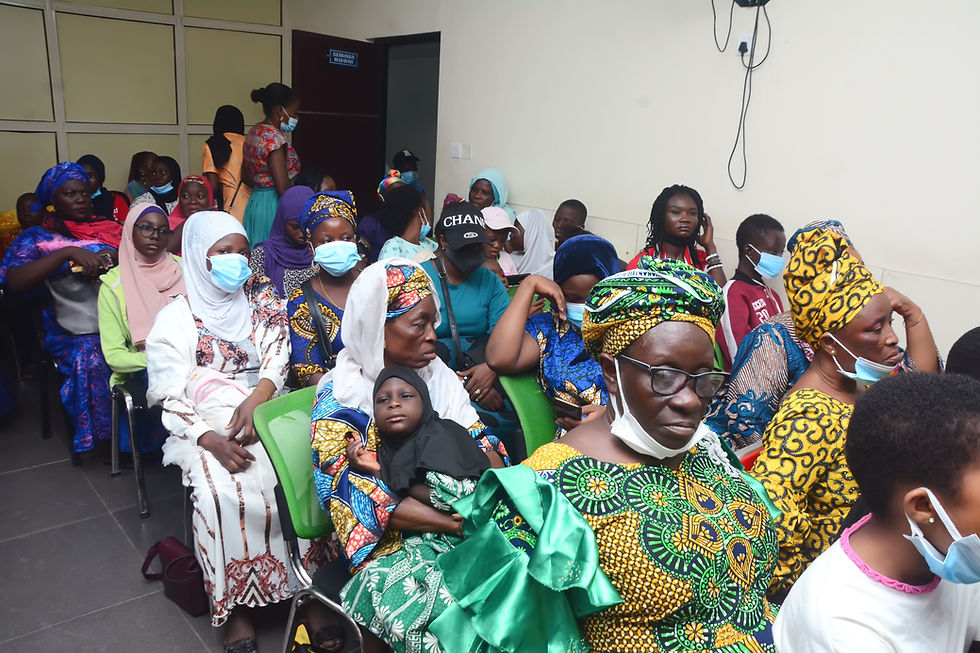Abandonment of Children with Sickle Cell Disorder: The Legal and Health Implications
- Tonymay Foundation
- Dec 23, 2022
- 4 min read
Tolu, a 5 year old girl with Sickle Cell Disorder was abandoned by her parents and left in the hands of her grandmother who was illiterate and had no knowledge of basic Sickle Cell Management.
At age 13, when Tolu was about to write her Junior Secondary School Examinations, she developed a brain stroke, a Sickle Cell Complication which resulted in physical and mental disability and eventually led her to drop out of School. Several years later, she died as a result of poor management of the Disorder.
Tolu's story is not different from so many other children who are abandoned by their children as a result of their health condition.
Child abandonment occurs when a child’s parents or guardian willfully withhold emotional physical and financial support with no regard for the child’s safety or welfare.
During the just concluded "Kit-A-Warrior " project, we recorded several cases of children Abandonment in the 5 locations were we conducted the training.
Some of the reasons they give is that they do nor have the financial resources to care for a child with Sickle Cell Disorder. Others have the belief that the child is an "Evil child" that has come to sap out their wealth.
There are so many laws in Nigeria that provide for the protection of the Child and prohibit Child Abandonment. One of them is the Child Right Act, 2003. Section 2 (1) of the Act provides that “ A Child shall be given such protection and care as it necessary for the wellbeing of the child taking into account the rights and duties of the child’s parents, legal guardians or other individuals …legal responsible for the child”. Section 10 (1) provides that “No child shall be subjected to any disability or deprivation merely by reason of the circumstances of his birth”. This means that a child should be subjected to any deprivation because he or she is born with Sickle Cell Disorder.
Section 11 provides that every child is entitled to respect for the dignity of his or her person and accordingly, no child shall be subjected to physical, mental or or emotional injury, neglect or maltreatment… Section 13 (2) provides that Every Government, parent, guardian, institution, service, agency, organization or body responsible shall endeavour to provide for the child the best attainable state of health. Section 14 also states that every child has the right to Parental care and protection and accordingly, no child shall be separated from his parents except for the purpose of education or welfare.
Accordingly, Section 16 (1) of the Violence Against Persons (Prohibition) Act, 2015 provides that a person who abandons a wife or husband, children or other dependent without sustenance commits an offense and is liable on conviction to a term of imprisonment not exceeding 3 years or to a fine not exceeding N500,000.00.
Abandoning Children with Sickle Cell Disorder obviously as its psychological and health implications. It poses adverse mental health issues such as depression and low self esteem which mostly leads to recurring episodes of Sickle Cell Crises, Sickle Cell Complications, substance abuse and most times suicidal attempts. Living with Sickle Cell Disorder poses financial burden on the family not to talk about an abandoned child. In a Country where more than 60% of the population pay out of pocket for their health expenses, managing Sickle Cell Condition places financial burden on the child who needs medication on a daily basis, coupled with regular blood transfusions and frequent hospital admissions. Where a child is abandoned by his or family, this could significantly take a negative toll on the child’s health as the child may be susceptible to Sickle Cell Complications that may lead to the child’s death. Good Nutrition plays a great role in the growth and development of every child, particularly a child with Sickle Cell Disorder. Where a child is malnourished, this could adversely affect a child’s health and wellbeing.
Family support plays a significant role in the health and life expectancy of a child with Sickle Cell Disorder. A family where the parents are greatly involved in the care and upbringing of a Child with Sickle Cell are mostly healthy even in their physiological features. They are less likely to fall ill and they have a better outlook about living with Sickle Cell Disorder. On the other hand, a child with Sickle Cell who is abandoned by their parents are more likely to fall into frequent Sickle Cell Crisis and Complications, they are usually prone to depression and lack of self worth .
Having a child with Sickle Cell Disorder or any Chronic illness can be very challenging, however, parents should realize that it is their primary responsibility to ensure the health and wellbeing of children born with this genetic condition. As provided in the Violence against Persons (Prohibition) Act. It is an act of violence and therefore an offense to wilfully abandon a child. The law stipulates penalties for offenders. State government and its agencies should enforce child protection and child abandonment provision laws to deter parents from abandoning their children especially when they are born with a health condition or a disability.
Where there is a right, there is a remedy. Children who are abandoned can enforce their rights in a Family Court through Non Governmental Organizations or their guardians. This will go a long way to reduce abandonment of Children with Sickle Cell Disorder in Nigeria.


Comments